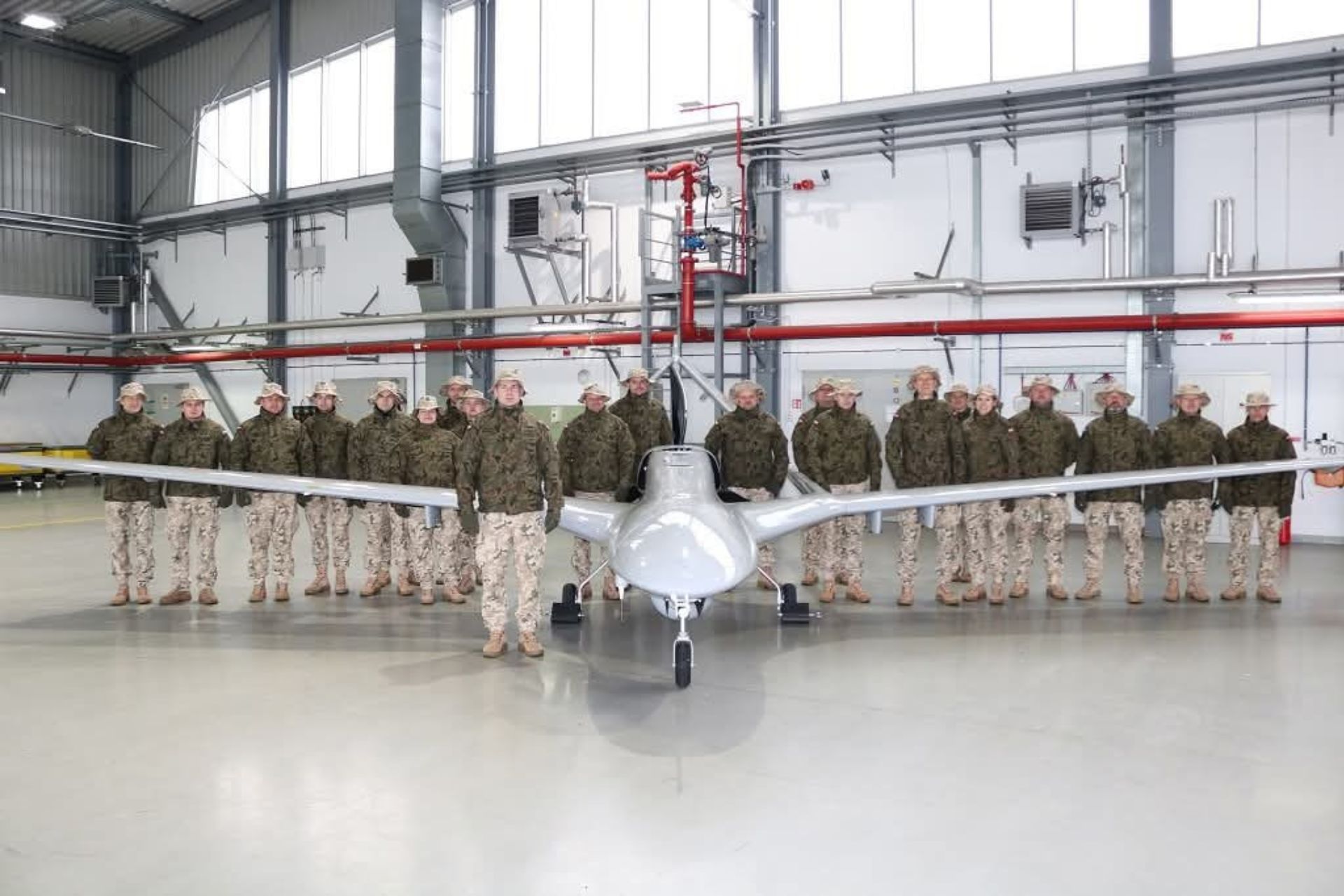Poland Deploys Bayraktar TB2 Drones in Türkiye to Strengthen NATO Security

{loadposition bannertop}
{loadposition sidebarpub}
On January 18, 2025, Poland officially announced the deployment of a military unit equipped with Bayraktar TB2 drones to Türkiye as part of a NATO mission aimed at enhancing the security of its member states in response to regional geopolitical challenges. This initiative falls under the “Tailored Assurance Measures for Türkiye” (TAMT), a program designed to support Türkiye’s security, particularly in light of increasing tensions along its border with Syria. The announcement was shared by the General Staff of the Polish Army on its official X social media page, highlighting the strategic importance of this deployment in key regions of the Eastern Mediterranean and the Black Sea.
Follow Army Recognition on Google News at this link
Poland acquired its first Bayraktar TB2 drones in 2021, becoming the first European Union country to integrate this system into its military arsenal (Picture source: General Staff of the Polish Armed Forces )
This mission will be carried out by the 12th Unmanned Aerial Vehicle Base in Mirosławiec, an operational unit specializing in the use of Medium Altitude Long Endurance (MALE) drones. The Bayraktar TB2 drones at the center of this operation will conduct surveillance, reconnaissance, and cooperation with NATO’s standing naval forces deployed in the region. These drones will also enhance the Alliance’s ability to monitor sensitive areas and respond effectively to potential threats. This deployment demonstrates Poland’s commitment to NATO’s collective security goals while actively addressing current geopolitical challenges.
The Bayraktar TB2, developed by Turkish company Baykar, is a versatile armed drone designed for intelligence, surveillance, reconnaissance (ISR), and precision strike missions. With a wingspan of 12 meters, a flight endurance of over 20 hours, and a payload capacity of 150 kilograms, the TB2 can carry four laser-guided munitions such as Roketsan MAM-L and MAM-C. Equipped with a redundant avionics system, it ensures fully autonomous operations, including taxiing, takeoff, and landing. Since its entry into service in 2014, the TB2 has accumulated over one million operational flight hours, demonstrating its effectiveness in the armed forces of Türkiye, Azerbaijan, Ukraine, and Qatar.
With advanced navigation features and the capability to operate independently of GPS, the TB2 has become a pivotal platform in modern military strategy. Powered by a 100-horsepower internal combustion engine, it can reach a maximum speed of 120 KTAS and operate at altitudes of up to 22,000 feet. Its real-time imagery transmission capabilities, combined with secure data storage and robust encryption systems, make it a critical tool for precision strikes and efficient surveillance, reducing collateral damage while enhancing civilian safety in conflict zones.
Poland acquired its first Bayraktar TB2 drones in 2021, becoming the first European Union country to integrate this system into its military arsenal. Operated by the 12th UAV Base in Mirosławiec, these drones are actively involved in reconnaissance and surveillance missions that support both national objectives and NATO commitments. Their acquisition has significantly bolstered Poland’s ISR capabilities, strengthening its strategic position within the Alliance.
The TAMT initiative was launched in 2020 at the request of the Turkish government, responding to the deteriorating security situation along the Syrian-Turkish border. Since then, several NATO members have participated in this program by deploying military units to Türkiye on a rotational basis. In May 2021, Poland had previously sent a contingent of 80 personnel, supported by an M28 Bryza patrol and reconnaissance aircraft, for a six-month mission. This prior engagement underscores the importance of allied cooperation in addressing regional challenges and reinforcing collective stability.
Since 2014, NATO has implemented “security assurance measures” to strengthen collective defense in the Alliance’s eastern regions. These measures include enhanced aerial surveillance with AWACS systems, regular exercises to improve interoperability, and maritime patrols to secure sensitive areas. For Türkiye, this support translates into increased allied presence, deeper intelligence-sharing, and heightened maritime activities in the Eastern Mediterranean. These collective efforts aim to provide a coordinated response to threats and challenges affecting NATO’s southern borders.
The integration of Bayraktar TB2 drones within TAMT highlights the growing importance of ISR technologies and precision-strike capabilities in modern defense strategies. By enabling continuous surveillance and rapid intervention, these drones enhance NATO’s operational readiness while providing direct support to member states facing immediate threats. Poland’s deployment in Türkiye not only reflects its allies’ commitment to collective security but also underscores the adaptability of military strategies to evolving security environments.
Poland’s deployment of Bayraktar TB2 drones as part of a NATO mission illustrates the significance of strategic alliances in addressing contemporary geopolitical challenges. This operation demonstrates the effective integration of modern technologies into military operations, reinforcing NATO’s collective commitment to ensuring regional stability and security.

{loadposition bannertop}
{loadposition sidebarpub}
On January 18, 2025, Poland officially announced the deployment of a military unit equipped with Bayraktar TB2 drones to Türkiye as part of a NATO mission aimed at enhancing the security of its member states in response to regional geopolitical challenges. This initiative falls under the “Tailored Assurance Measures for Türkiye” (TAMT), a program designed to support Türkiye’s security, particularly in light of increasing tensions along its border with Syria. The announcement was shared by the General Staff of the Polish Army on its official X social media page, highlighting the strategic importance of this deployment in key regions of the Eastern Mediterranean and the Black Sea.
Poland acquired its first Bayraktar TB2 drones in 2021, becoming the first European Union country to integrate this system into its military arsenal (Picture source: General Staff of the Polish Armed Forces )
This mission will be carried out by the 12th Unmanned Aerial Vehicle Base in Mirosławiec, an operational unit specializing in the use of Medium Altitude Long Endurance (MALE) drones. The Bayraktar TB2 drones at the center of this operation will conduct surveillance, reconnaissance, and cooperation with NATO’s standing naval forces deployed in the region. These drones will also enhance the Alliance’s ability to monitor sensitive areas and respond effectively to potential threats. This deployment demonstrates Poland’s commitment to NATO’s collective security goals while actively addressing current geopolitical challenges.
The Bayraktar TB2, developed by Turkish company Baykar, is a versatile armed drone designed for intelligence, surveillance, reconnaissance (ISR), and precision strike missions. With a wingspan of 12 meters, a flight endurance of over 20 hours, and a payload capacity of 150 kilograms, the TB2 can carry four laser-guided munitions such as Roketsan MAM-L and MAM-C. Equipped with a redundant avionics system, it ensures fully autonomous operations, including taxiing, takeoff, and landing. Since its entry into service in 2014, the TB2 has accumulated over one million operational flight hours, demonstrating its effectiveness in the armed forces of Türkiye, Azerbaijan, Ukraine, and Qatar.
With advanced navigation features and the capability to operate independently of GPS, the TB2 has become a pivotal platform in modern military strategy. Powered by a 100-horsepower internal combustion engine, it can reach a maximum speed of 120 KTAS and operate at altitudes of up to 22,000 feet. Its real-time imagery transmission capabilities, combined with secure data storage and robust encryption systems, make it a critical tool for precision strikes and efficient surveillance, reducing collateral damage while enhancing civilian safety in conflict zones.
Poland acquired its first Bayraktar TB2 drones in 2021, becoming the first European Union country to integrate this system into its military arsenal. Operated by the 12th UAV Base in Mirosławiec, these drones are actively involved in reconnaissance and surveillance missions that support both national objectives and NATO commitments. Their acquisition has significantly bolstered Poland’s ISR capabilities, strengthening its strategic position within the Alliance.
The TAMT initiative was launched in 2020 at the request of the Turkish government, responding to the deteriorating security situation along the Syrian-Turkish border. Since then, several NATO members have participated in this program by deploying military units to Türkiye on a rotational basis. In May 2021, Poland had previously sent a contingent of 80 personnel, supported by an M28 Bryza patrol and reconnaissance aircraft, for a six-month mission. This prior engagement underscores the importance of allied cooperation in addressing regional challenges and reinforcing collective stability.
Since 2014, NATO has implemented “security assurance measures” to strengthen collective defense in the Alliance’s eastern regions. These measures include enhanced aerial surveillance with AWACS systems, regular exercises to improve interoperability, and maritime patrols to secure sensitive areas. For Türkiye, this support translates into increased allied presence, deeper intelligence-sharing, and heightened maritime activities in the Eastern Mediterranean. These collective efforts aim to provide a coordinated response to threats and challenges affecting NATO’s southern borders.
The integration of Bayraktar TB2 drones within TAMT highlights the growing importance of ISR technologies and precision-strike capabilities in modern defense strategies. By enabling continuous surveillance and rapid intervention, these drones enhance NATO’s operational readiness while providing direct support to member states facing immediate threats. Poland’s deployment in Türkiye not only reflects its allies’ commitment to collective security but also underscores the adaptability of military strategies to evolving security environments.
Poland’s deployment of Bayraktar TB2 drones as part of a NATO mission illustrates the significance of strategic alliances in addressing contemporary geopolitical challenges. This operation demonstrates the effective integration of modern technologies into military operations, reinforcing NATO’s collective commitment to ensuring regional stability and security.





